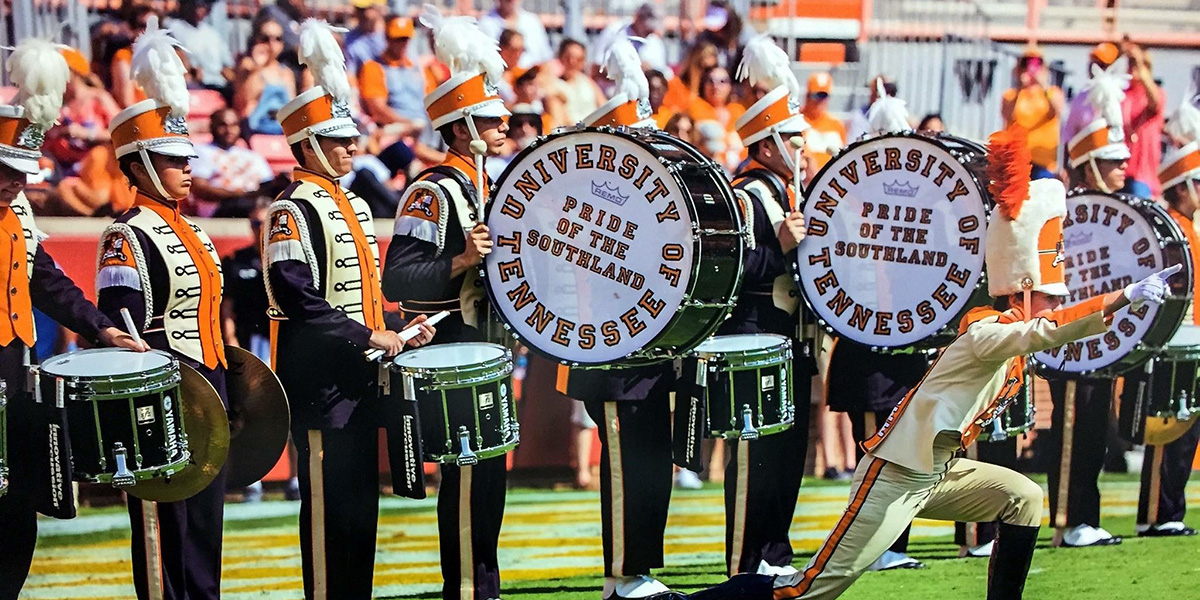When people ask what I was involved in at UT outside of my required classes, I name two things: serving as the Drum Major for the Pride of the Southland Marching Band and being a part of the Chancellor’s Honors Program. Balancing these two ‘extracurricular’ activities was a challenging, but fulfilling journey.
 I started playing flute in sixth grade band, and I was hooked. From high school marching band to drum corps, this activity has been such a big part of my life; I could not imagine my college experience without marching band. As an Alabamian, I had no idea how much of an honor it was just to be a member of the Pride. As a freshman, I quickly learned how dedicated one has to be to earn a spot on the field in Neyland Stadium.
I started playing flute in sixth grade band, and I was hooked. From high school marching band to drum corps, this activity has been such a big part of my life; I could not imagine my college experience without marching band. As an Alabamian, I had no idea how much of an honor it was just to be a member of the Pride. As a freshman, I quickly learned how dedicated one has to be to earn a spot on the field in Neyland Stadium.
A student’s audition for Drum Major implicitly starts on his or her first day at band camp as a freshman. The band is looking for someone who learns very quickly, who performs well under pressure, and who inspires his or her peers to achieve more. I became a squad leader (section leader) my sophomore year, and this let me showcase my leadership skills on the field daily. At the end of my sophomore year, I applied to enter the rigorous audition process for Drum Major. Candidates submit a written application and then may be invited to a live audition on the day of the Orange and White Game. This involves an interview with the band directors, performing the famous ‘strut’ for the band, conducting the band, answering the students’ questions, and finally conducting under pressure during the Spring game. I began preparing early, and it was a huge undertaking. However, all my hard work paid off, and I spent the the 2017 and 2018 football seasons conducting “Rocky Top”!
Band taught me many things that will serve me my entire life. To start, time management is key for every member of the Pride. The combination of being the Drum Major and taking an honors schedule made this even more essential. During fall semesters, I had to be mindful of the number of hours I enrolled in. I completed most of my honors service hours in the spring since my fall weekends were often spent on the road or in Neyland. Additionally, being the Drum Major on game day is all about performing under pressure and making quick decisions. As a musician, it was a great experience to perform for 100,000 people every Saturday. I also had to organize and motivate others, a hugely important skill in any career. Simultaneously, my CHP research gave me a leg-up in the graduate school audition process. Even though I applied for performance degrees, I had multiple professors comment on the fact that I have participated in CHP and written a thesis.

My thesis project was entitled “A Quiet Mind: The Key to Musical Performance.” My research was inspired by my aural skills professor, a graduate music theory student. He was such a supportive mentor to my entire class. I asked him questions about the things he mentioned in class that were, on the surface, unrelated to music–how the brain organizes information, how what one sounds like on his or her instrument is a direct result of how vividly one imagines the sound. He in turn lent me books about mindfulness and psychology. These books became the basis for my research. I continued reading literature on mindfulness and sports psychology and applied those theories to performing music.
Writing my thesis was very reflective process for me. I learned so much about my habits as a musician and as a performer. Even though I wrote an entire paper on how to focus while playing my instrument, I know I will be working the rest of my life to achieve what I wrote about! I keep learning more about how to be a successful musician every single day and already want to go back and adjust some of the theories I presented. Though I thought I would know exactly what I wanted to do with my life by the end of my undergraduate career, I now realize that my college experience was about opening more doors for myself rather than pinpointing exactly what I should pursue, apart from music generally. I realize that this is OK, and I’m looking forward to figuring out exactly how to capitalize on my undergraduate involvement to support my career.
